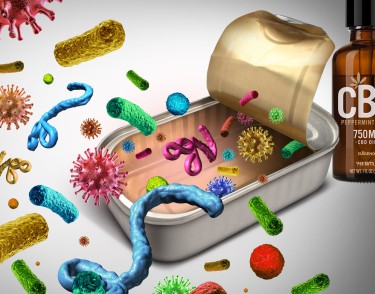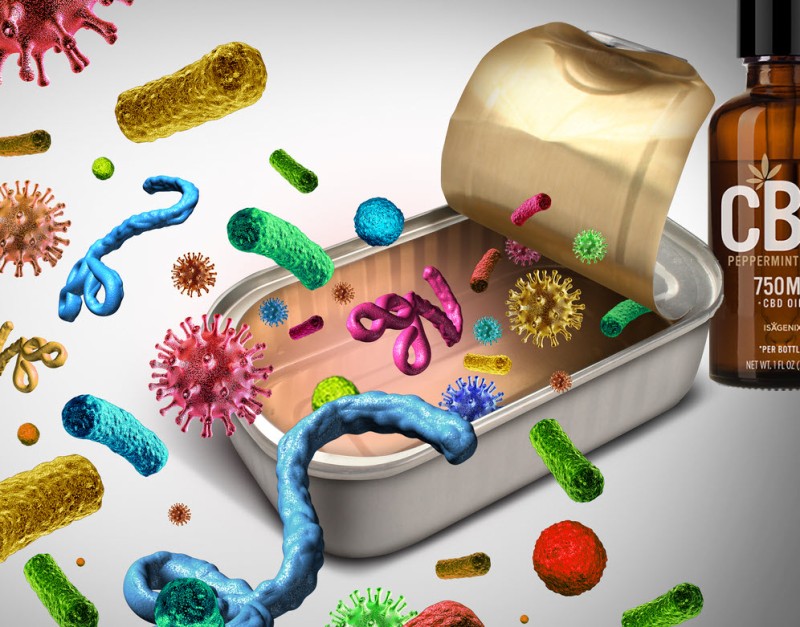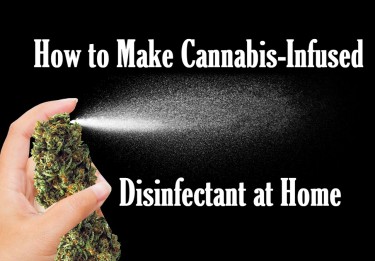
Studies Show CBD Could Be Promising Treatment For Salmonella
Salmonella is a common disease caused by an infection of the salmonellosis bacteria.
Salmonella infections usually occur when people eat or drink water and food that has been contaminated. The symptoms will usually present a few hours up to 3 days later after exposure; these include diarrhea, abdominal cramps, chills, vomiting, and fever. While most cases of salmonella will usually resolve on its own, individuals who have been contaminated must be careful not to let themselves dehydrate otherwise this may require emergency medical attention.
When salmonella doesn’t escalate into a serious condition, it normally disappears within a few days, especially when one hydrates properly. However, treatment for moderate to severe cases may require the use of antibiotics and anti-diarrheal medication.
That may not always work, since antibiotic-resistant salmonella has proven to be a major problem for public health. Additionally, antibiotics can have its own side effects such as how it kills off even good bacteria in the human body. Because of this, there is a need for alternative treatments and perhaps more natural solutions to salmonella or other bacterial conditions without any side effects.
But cannabis may help.
A recent study conducted by researchers at the Alabama State University analyzed the effect of whole-plant CBD on several kinds of salmonella. The data, which was published in the medical journal Molecules, tested CBD against salmonella typhimurium and salmonella Newington.
“Salmonella infections are typically treated with broad-spectrum antibiotics such as ampicillin; however, the development of resistance to these treatments has become more prevalent, thus increasing the need for alternative treatments… These experiments confirmed that CBD has antibacterial activity against our target bacteria. Additionally, our comparative studies showed that CBD has antibacterial activity similar to ampicillin… These results posed the question of CBD-antibiotic co-therapy as a potential novel application,” the researchers reported.
They found that CBD was effective in treating the salmonella. “Discovery and development of novel antibacterial agents such as CBD are a major step towards the future of therapeutics in a world where antibiotics are no longer efficacious and cost effective,” they wrote. “This study further progresses our current knowledge on the effectiveness of CBD as an antibacterial agent and demonstrates the effectiveness of CBD against Gram-negative bacteria, S.typhimurium and S.newington,” reads the report.
“While this study illuminates the potential of CBD as a therapeutic and fills a void in the current literature, future work is necessary for further development of this bioactive compound as a therapeutic agent,” they concluded.
Antibacterial Properties Of Cannabis
Salmonella is just among the many common bacterial infections that plague humans. There are various types of bacteria out there, all of which have different effects on the human body. Both kids and adults alike can be prone to bacterial infections.
Another study from 2021 revealed that CBD was effective in killing Gram-positive and Gram-negative bacteria. These types of bacteria are notorious for their antibiotic resistant nature since their biological makeup includes an outer cell membrane, which protects them from antibiotics. The researchers in Australia found that CBD was surprisingly beneficial in killing them, which means that CBD could be the foundation of new antibiotic medications that have been effective in treating Gram-negative bacteria, the first of its kind since the 1960’s.
The report states that CBD was not only effective in treating Gram-positive bacteria, including Streptococcus pneumoniae and Staphylococcus aureus as well as Clostridiodes difficile; it also showed to be beneficial in treating Gram-negative bacteria such as Neisseria meningitides, Neisseria gonnorhoeae, and Moraxella catarrhalis among others. These are the bacteria responsible for gonorrhea, meningitis, pneumonia, and bronchitis among other conditions studied by the researchers.
“Our results demonstrate that cannabidiol has excellent activity against biofilms, little propensity to induce resistance, and topical in vivo efficacy,” they wrote. “Multiple mode-of-action studies point to membrane disruption as cannabidiol’s primary mechanism,” they said.
“Cannabidiol showed a low tendency to cause resistance in bacteria even when we sped up potential development by increasing concentrations of the antibiotic during ‘treatment’,” explained Mark Blaskovich, PhD, the report’s author. “We think that cannabidiol kills bacteria by bursting their outer cell membranes, but we don’t know yet exactly how it does that, and we need to do further research,” he said.
Meanwhile, an older study from 2019 by researchers at the Universita del Piemonte Orientale of Italy and the University of London in Britain analyzed cannabinoids and its impact on MRSA. The study, whose results were published in the Journal of Natural Products, analyzed CBD, CBG, THC, CBN, and CBC on several strains of MRSA and other multi-drug resistant bacteria.
“All compounds showed potent antibacterial activity,” wrote the authors. They also noted that the cannabinoids performed “exceptional” antibacterial activity against a serious epidemic MRSA that was affecting hospitals in the United Kingdom. “Although the use of cannabinoids as systemic antibacterial agents awaits rigorous clinical trials… their topical application to reduce skin colonization by MRSA seems promising… Cannabis sativa… represents an interesting source of antibacterial agents to address the problem of multidrug resistance in MRSA and other pathogenic bacteria,” they concluded.
Conclusion
According to data from the 2019 Global Burden of Diseases, Injuries and Risk Factors Study, 1.27 million deaths have been caused by bacterial antimicrobial resistance (AMR). “AMR is truly a global problem that requires urgent action from policymakers and the health community to avoid preventable deaths,” explains Mohsen Naghavi, a University of Washington scientist of health metrics.
Given this staggering data, cannabis is a promising solution that can help prevent millions of deaths each year.






